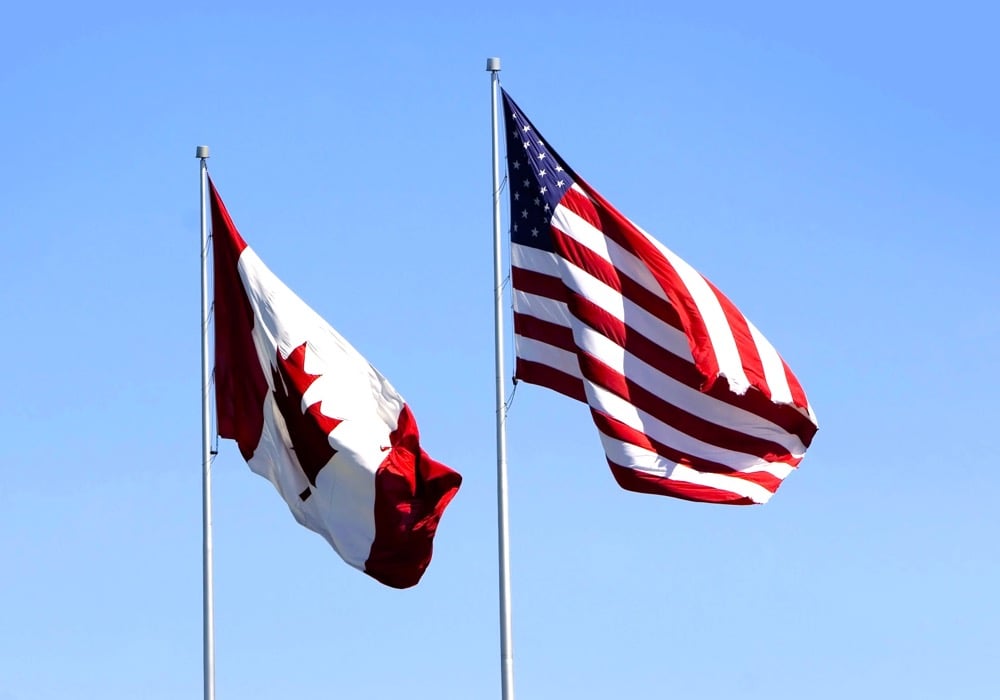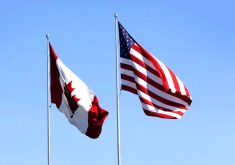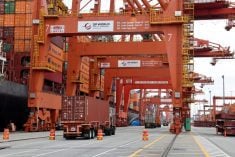ROBLIN, Man. — It’s hard to look inconspicuous when wearing a vivid yellow golf shirt.
Three field specialists with North Dakota State University stood out from the crowd at a Manitoba Agriculture field day, held south of Roblin in late July.
The NDSU employees traveled to Roblin to learn about industrial hemp, which hasn’t been grown in North Dakota for decades — until now.
NDSU agricultural scientists are growing industrial hemp this summer at the university’s research site in Langdon, N.D., about 30 km south of the Canadian border.
Read Also

Canadian trade data delayed by U.S. government shutdown
Canadian international trade data for September will be delayed indefinitely due to the ongoing partial shutdown of the United States government, Statistics Canada said Friday, Oct. 24.
The researchers and extension personnel are evaluating the performance of hemp varieties to identify what may or may not work in the state.
“This is the first summer of actual plots of industrial hemp,” said Burton Johnson, a NDSU plant science professor who also attended the field day in Roblin but wasn’t dressed in bright yellow.
“There are a lot of basic agronomic practices we need to nail down for our production region. They would likely be different than here (Western Canada). So that would be the first wave of research studies.”
Johnson and his team are studying the suitability of 12 hemp varieties, including five from Western Canada.
North Dakota growers need agronomic information on factors such as seeding dates, plant stand establishment and harvest management.
NDSU also plans to study the economics of hemp production.
“We need to demonstrate some economic competiveness with the crops that (farmers) grow,” Johnson said.
“If it isn’t in the ballpark, it’s not going to happen.”
As of late July, Johnson said the hemp plots in Langdon were looking great. Most of the crop was 1.75 to 2.25 metres tall.
The agronomic and economic research is needed because hemp could be commercially grown in the state as early as next year.
North Dakota passed a law in March that paves the way for hemp production. It allows farmers to grow hemp for research or commercial purposes, but producers don’t need approval from the U.S. federal government.
As reported in the Huffington Post, the law states that a “license required by this section is not conditioned on or subject to review or approval by the United States Drug Enforcement Agency.”
The state agriculture department will take over that role by issuing licenses for hemp production in North Dakota.
Johnson said agronomic research on hemp is no different than any other crop, with the exception of acquiring seed.
Last year, a grower from Colorado attempted to transport hemp seed bought in Canada across the Manitoba-North Dakota border, but it was detained by U.S. border officials.
Anndrea Hermann, a hemp industry consultant, helped NDSU import hemp varieties developed in Canada, France and Australia.
She said the process was smooth.
“I actually think (it) was fairly simple. It was just having good communication with … Agriculture Canada and Customs Border Patrol,” she said.
“Nothing was detained at customs. Nothing was held. Everything went through.”
Hermann said North Dakota is moving ahead cautiously on hemp as scientists and government representatives want to carefully re-launch commercial production.
“Not only the ‘go slow.’ We’ve taken … a very silent approach to the (research). We haven’t put a lot of PR pieces out,” she said.
“Take it nice and slow so we’re not foisting something up before we have some success…. Just like with every other crop. We do variety trials first. We just don’t introduce it and put the risk on the farmer.”
North Dakota’s approach is different from Colorado, where state officials have a hands-off philosophy.
Colorado farmers are permitted to cultivate hemp for research purposes, but some are already growing and selling hemp products into the commercial market.
Some in the hemp trade have described the situation in Colorado as the “Wild West,” in which farmers are growing unknown or unproven hemp varieties.
Several Canadian companies are refusing to export hemp seed to Colorado because they are concerned about intellectual property rights.
“I think we’re at the stage of trying to figure out the lay of the land and figuring out how things work before we dive in,” said Kevin Friesen, operations manager with Hemp Genetics International, which develops and sells hemp varieties.
“We don’t want to have someone smuggle across five gallons of our variety and it becomes the next premier U.S. variety and we receive no royalties for our efforts.”
Hermann said that’s not the case in North Dakota, where the nascent hemp industry intends to respect plant breeders’ rights.
robert.arnason@producer.com















